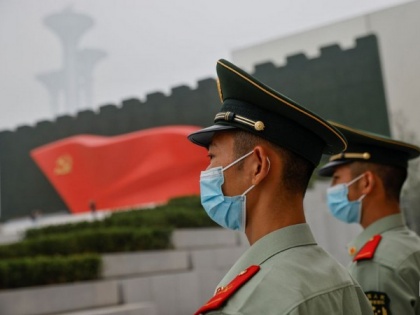Chinese overseas surveillance station exposed in the US
By ANI | Published: April 21, 2023 09:45 AM2023-04-21T09:45:55+5:302023-04-21T09:50:24+5:30
New Delhi [India], April 21 : In a shocking turn of events, on April 17, United States federal officials ...

Chinese overseas surveillance station exposed in the US
New Delhi [India], April 21 : In a shocking turn of events, on April 17, United States federal officials apprehended two New York residents for running an "unauthorized police station" out of a Manhattan office building, utilizing it to locate and intimidate a Chinese dissident residing in California.
Lu Jianwang, 61, and Chen Jinping, 59, both New York residents, are facing charges of conspiracy to act as China's agents and obstruction of justice.
Beijing has denied running these stations, characterizing them as "service centres" for overseas Chinese nationals. As per the US Department of Justice, the two Chinese-origin residents collaborated to establish the "first overseas police station" on behalf of China's Ministry of Public Security (MPS) in the country.
These police stations are part of at least 100 functioning across 53 countries, including the United Kingdom and the Netherlands.
Last month, Canadian police initiated an investigation into two sites near Montreal suspected to be Chinese police outposts. These developments demonstrate that Beijing has augmented its overseas surveillance operations worldwide to target dissenting Chinese nationals.
A Justice Department's National Security Division official affirmed that "the actions of the People's Republic of China go well beyond acceptable conduct for a nation-state. We will vigorously safeguard the liberties of all individuals living in our country against the threat of authoritarian oppression."
Beijing is apprehensive about its citizens going rogue in a "third" country, particularly in the US and European cities.
As a result, Chinese security agencies have been actively intimidating dissidents abroad to avoid international embarrassment on human rights issues and quash any signs of rebellion.
Interestingly, the Chinese government uses 'Chinatowns' in different cities across the globe for its covert activities. The police station in the US was based in Manhattan's Chinatown and was established in February 2022. It was operated by China's Ministry of Public Security (MPS).
In another case, the Department of Justice has filed charges against 40 MPS officers and four others for orchestrating an "internet troll operation" against Chinese dissidents in the US.
Chinese agents fabricated social media profiles to harass dissidents and even enlisted an employee at an "unidentified" US telecommunications company to bsh a 'pro-democracy' activist from the platform.
The accused officers, believed to be in China, are members of an MPS unit known as the "912 special project working group," which is dedicated to tracking down dissidents overseas.
These criminal proceedings reveal the various means through which the Chinese government employs "covert surveillance tactics" to monitor and intimidate critics residing beyond China's borders.
As reported last year by Safeguard Defenders, a human rights orgzation that monitors disappearances in China, Beijing has established 102 covert police stations across 53 countries to monitor and harass Chinese citizens residing abroad.
These stations are primarily located in Europe, with nine in Spain, four in Italy, three in France, two in the Netherlands, and three in the United Kingdom, specifically in London and Glasgow, where their activities have been under police investigation.
With China's increased geopolitical assertiveness under President Xi Jinping, the country has become more aggressive in safeguarding its global image by employing repressive measures against its own citizens in various parts of the world.
These recent disclosures are likely to further strain already vulnerable US-China bilateral relations and may have significant diplomatic implications.
Expectedly, the Chinese government has refuted the US allegations and stated that it "firmly opposes" the arrest of two Chinese nationals. The statement went on to say, "We urge the US to engage in self-reflection, abandon its Cold War mentality and ideological bias...and cease smearing and attacking China."
During a Senate hearing last year, Christopher A Wray, the Director of the Federal Bureau of Investigation (FBI), shared his knowledge of the secret Chinese stations in the US.
Notably, the recent arrests are the first of their kind in the world against individuals associated with these unauthorised Chinese police stations.
It has been reported that the two suspects deleted their communications with the Chinese government upon learning of the FBI's investigation of the Manhattan police station.
This has made it more difficult for US law enforcement to determine the full scope of the covert station's operations and how many American citizens may have been monitored through the Communist Party of China-sponsored surveillance activities on US soil.
Reports indicate that victims of Chinese surveillance in the US were repeatedly harassed, and one of them had their car broken into shortly after delivering a "pro-democracy speech."
Additionally, one victim received "harassing" calls and messages from social media accounts linked to the Chinese government. Chinese officers operating fake online accounts are given instructions on whom and how to target in the US.
These secret stations show the Chinese government's global reach to curtail political enemies no matter where they are based in the world.
The New York case reveals how deeply Chinese agents have penetrated in the US. Analysts have suggested this is just the tip of the iceberg as Chinese overseas surveillance activities have become far more sophisticated in recent years.
The author of this opinion piece is Dr Maheep, an expert on India's Foreign affairs. He is the Principal Investigator of a National Project on India's Soft Power Diplomacy.
Disclaimer: This post has been auto-published from an agency feed without any modifications to the text and has not been reviewed by an editor
Open in app